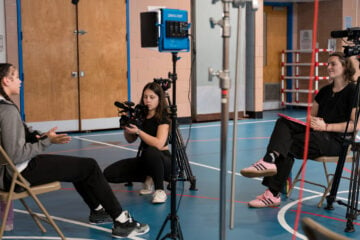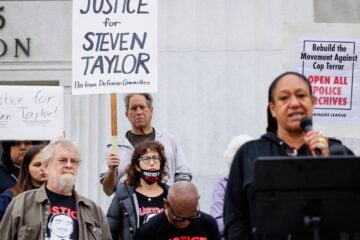US Ignite partnership will push for apps using a faster, smarter Internet
The state-operated Utah Education Network and several municipalities are among about 100 members of US Ignite, a new partnership creating services for future broadband networks running up to 100 times faster than today’s Internet.
This White House announced the partnership this morning, and President Obama will sign an executive order streamlining the approval process for building broadband infrastructure on and under federal property and coordinating excavations. It will reduce costs, for instance, by permitting broadband construction during highway-building.
For a vivid demo of the power that the new networks make possible, John Underkoffler of Oblong Industries, showed off a video of G-speak, a commercially available human-machine interface based on Oblong’s design for the Wii-like technology used in the Tom Cruise movie Minority Report.
The press conference kicked off a day-long series of sessions and other events.
Subra Suresh, director of the National Science Foundation, the lead agency in US Ignite, said the government wants to “jump start the next revolution in networking” for the public interest, including education, advanced manufacturing, medical monitoring and emergency preparedness.
NSF published a Dear Colleague letter today, urging researchers to develop the apps while it announced Mozilla Ignite, a competition open to nonprofessionals as well.
The Mozilla challenge, sponsored by the open-source software group Mozilla and NSF, aims to spark development of new public-interest apps that use a much faster, upgraded Internet. Prizes in three rounds will total $500,000. The first round, with entries due Aug. 23 and $15,000 in prizes, is just looking for the best ideas. (Register for email updates.)
NSF itself will allot an additional $20 million to its GENI (Global Environment for Network Innovation) “virtual laboratory” for networking research involving more than 300 researchers at dozens of universities. (GENI will hold its annual engineering conference July 9-11 in Boston.)
With NSF money, for example, researchers at the University of Missouri in Columbia are developing a telemedicine system with unobtrusive sensors that helps maintain the health of senior citizens living in their own homes.
A map shows many of the US Ignite members. One member is closely related to public media — the Utah Education Network, a sister organization of KUED-TV in Salt Lake City. UEN is expanding to serve 780,000 kids in Utah schools by December. It received an earlier $13.6 million federal grant to upgrade and extend its network to 130 schools and other community institutions.
A number of US Ignite members are municipalities, including San Francisco and UTOPIA, a consortium of Utah cities. Santa Monica, Calif., already operates a 10 gigabit fiber optic network that attracts and keeps media, tech and gaming companies. Wilson, N.C., a city near Raleigh that operates its own Greenlight fiber network, will develop apps for such services as smart-grid electrical power monitoring.
Cleveland researchers showed off Surgical Theater, an app that allows surgeons to rehearse difficult surgeries using interactive 3-D computer models while consulting with colleagues in other cities who can see the same simulation.
Many partners in US Ignite are private telecom companies. Verizon will experiment with 20 Philadelphia households, raising their Internet speeds from about 20 megabits per second to 300 Mbps.
US Ignite also includes:
- equipment manufacturers such as Cisco Systems and Hewlett-Packard;
- medical institutions such as the Mayo Clinic, which has been leading the expansion of a regional telemedicine network in southeast Minnesota;
- nine federal agencies such as the Agriculture Department’s Rural Utility Service, which released $14.6 million for more than 50 distance-learning and telemedicine projects serving rural residents; and
- philanthropies including the Lyndhurst Foundation, a backer of the Gig City initiative that made Chattanooga, Tenn., the first city in the hemisphere to offer 1 Gig Internet service to all of its residents. Another member, the Charles Stewart Mott Foundation, gave US Ignite a planning grant for workforce training and other projects in its hometown, Flint, Mich.





